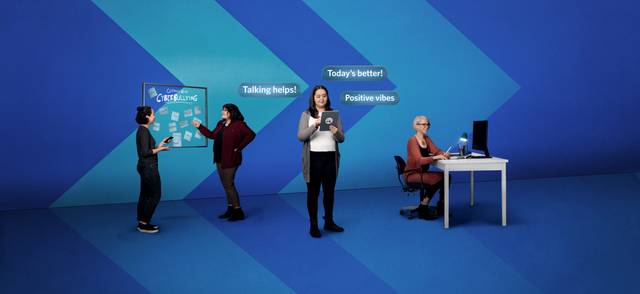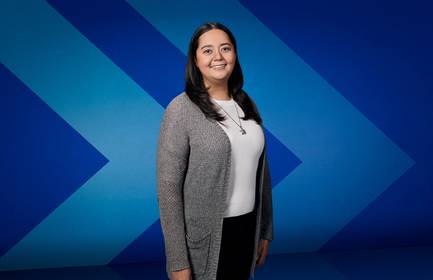Bringing Indigenous ways of knowing into mental health supports
This story is part of the Forward happens here series.
Dr. Johanna Sam’s team at UBC is listening to the experiences of diverse youth to help them develop coping strategies for cyberbullying
While young people may not use the term “cyberbullying”, they sure know when somebody is mean to them online. That can take different forms, from having an unwanted photo of them shared on social media to being excluded from a group chat. They could be targeted by a spam social media account or have their account used to spam others.
Researchers know that cyberbullying impacts youth mental health and can lead to anxiety, depression and substance use. But they don’t know if Indigenous youth are being targeted differently than other youth—through hate speech or online discrimination, for example. They also don’t know how best to help them cope. “That’s what we’re trying to figure out,” says Dr. Johanna Sam, an assistant professor in UBC’s Faculty of Education and a citizen of the Tŝilhqot’in Nation. “Because Indigenous youth have been excluded from this research, we know very little.”
Dr. Sam and her team are working to bridge the diversity gap in educational and developmental psychology research. By doing so, they can help communities, schools and parents better target mental health supports and develop programs and policies to promote healthy device use.
Taking a “two-eyed seeing” approach to cyberbullying research
Dr. Sam is researching how cyberbullying impacts the mental health of young people, including the relationships between online aggression, resiliency, academic achievement and wellness.
“I’m really interested in mental health promotion,” she says. “How do we prevent mental health problems from happening down the road? How can we help young people be resilient, and how can we support them?”
Dr. Sam leads a team of researchers in the Community-based Indigeneity, Resiliency and Cyberbullying Lab in Education (C.I.R.C.L.E) at UBC. The team connects with teens, community members, educators and researchers to promote youth wellbeing in online spaces. Their main project, researching how both Indigenous and non-Indigenous youth cope with cyber aggression, takes a “two-eyed seeing” approach.
“’Two-eyed seeing’ is an Indigenous concept from the East Coast, from Mi’kmaq Elder Albert Marshall,” explains Dr. Sam. “You see Western approaches, Western concepts in one side of your eye, and then on the other side of your eye, equally, you see Indigenous ways of knowing and Indigenous concepts. So out of both eyes, they’re equivalent.”
That’s important, she says, because almost all research in developmental and educational psychology has previously been done from a single perspective—a Western one.
“In Western ways of knowing, it’s all about personal resiliency….In an Indigenous concept, resiliency would include your family, your community, your culture.”
– Dr. Johanna Sam, assistant professor, UBC Faculty of Education
Moving inclusive research forward
As an undergraduate student and throughout her career, Dr. Sam says that she never came across another Indigenous researcher in the psychology field. “I would go to psychology conferences and, for the cultural components or presentations, it was non-Indigenous people presenting on Indigenous psychology.”
She created the C.I.R.C.L.E lab to inform anti-racism and Indigenous ways of knowing in cyberbullying, mental health promotion and curriculum development. The acronym references a sharing circle, which is a community-focused, Indigenous way of knowing that brings people together.
For the “two-eyed seeing” project, the team is surveying students across Canada about their experiences around cyberbullying. They’re gathering data from young people through a smartphone app that captures their daily experiences. Another project, Tŝilhqot’in Online Warriors, is looking specifically at how Tŝilhqot’in youth engage with technology.
The UBC team is working hard to make their research inclusive. The team includes co-investigator Dr. Jenna Shapka, whose Developmental Change and Technology Lab looks at child and adolescent social development in an increasingly technological world. Graduate student Leor Elizur is recruiting study participants online. And Mariah MacDonald, an undergraduate research assistant who is part of the Indigenous Teacher Education Program, is working to create a youth-friendly survey and a safe online environment.
“We are having one sharing circle for all youth of any background, and a separate one for Indigenous-only youth,” Dr. Sam explains. “That’s where ‘two-eyed seeing’ comes in. We want to give Indigenous youth a safe space to talk about unique things that come up or that they experience being Indigenous.”
Incorporating Indigenous ways of knowing into coping strategies
Dr. Sam’s prior research has found that youth of all backgrounds who are cyberbullied are more likely to engage in substance use. But having a trusted adult helps to mitigate the risk of using substances. “If we can help them build these relationships with adults, we can hopefully prevent them from coping through drugs and alcohol down the road.”
With these projects, she hopes to gain insight into additional effective ways of coping for Indigenous young people, which may be more focused on the community than on the individual.
“In Western ways of knowing, it’s all about personal resiliency,” she explains. “‘How well I can be resilient as an individual?’ Whereas in an Indigenous concept, resiliency would include your family, your community, your culture.”
Mental health coping strategies could also involve strengthening community connections or connection to the land, such as medicine walks by knowledge keepers. “Connection to the land isn’t even looked at in mental health and wellbeing from a Western way of knowing,” Dr. Sam says. “But with Indigenous ways of knowing, the connection and relationship to land is so important.”
Bridging digital divides
For the Tŝilhqot’in Online Warriors project, the C.I.R.C.L.E team has partnered with the Tŝilhqot’in Nation to help foster healthy device use among Tŝilhqot’in youth.
Dr. Sam points out that there’s a big digital divide in access to technology between rural, Indigenous and urban youth. The Tŝilhqot’in National Government, made up of six communities including ʔEsdilagh, Yuneŝit’in, Tŝideldel, Tl’esqox and Xeni Gwet’in, has received a Canadian Internet Registration Association grant to build infrastructure for high-speed internet. Dr. Sam is working in partnership with the Tŝilhqot’in National Government to learn what youth in these communities are doing online as they connect to the internet.
Communities and schools across Canada share the challenge of harnessing the benefits of technology while minimizing the harmful ones. Dr. Sam hopes her team can help by really listening to what diverse youth have to say and supporting them in developing effective coping strategies. The research could have a positive impact on youth both locally and on a national scale. “There are so many silos in mental health promotion,” she says. “This is about finding ways to all come together and support each other.”







